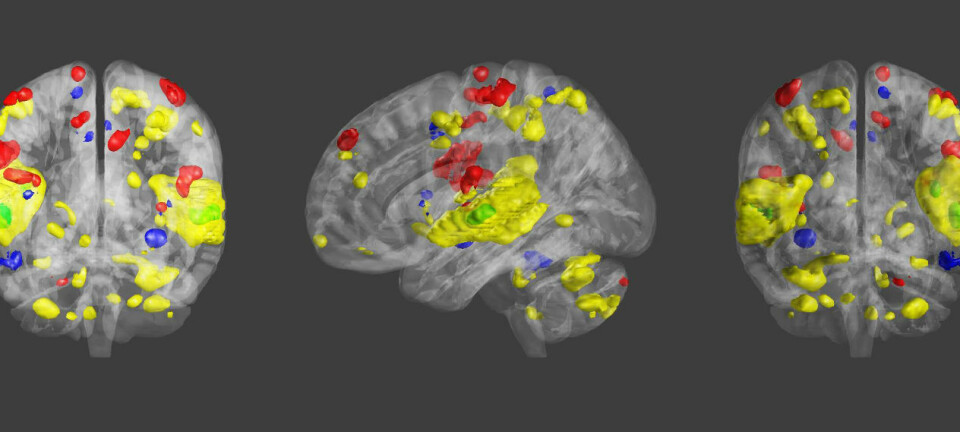
A brainier website
Brainfacts.org was launched yesterday with the help of some the world’s leading neuroscientists. The new site will provide the general public with authoritative information about the brain.
Denne artikkelen er over ti år gammel og kan inneholde utdatert informasjon.
"The website was started because so many advances are being made in neuroscience and we want to spread information about what’s happening," says Edvard Moser, a professor of neuroscience at NTNU - the Norwegian University of Science and Technology.
“Another reason is that there is so much information about the brain on the internet and not all of it is correct," he says. "So we felt it was important to get a website out there that draws on the most up-to-date and important knowledge, where experts ensure the quality of content."
Together with his wife May-Britt Moser, he heads the Kavli Institute of Systems Neuroscience at NTNU in Trondheim.

Moser is a member of an editorial panel of seven brain researchers from the US, Europe and Australia who will meet once a month to decide on topics and research they think the international website should cover.
They want brainfacts.org to become an information channel which is understandable for most readers and useful for students and educators alike.
Major discoveries ahead
We humans are equipped to think about our ability to think, using that strange spongy organ in our skulls.
Neuroscience is the study of the brain and the nervous system.
“We will be learning a lot of new things about the brain in the years ahead, and much has been discovered only recently,” says Moser.
Such advances are partly due to heightened precision in the methods for investigating what the brain is doing as it steers our lives by perceiving, signalling and storing information.
Many of the key questions remain open – for instance, how do nerve cells cooperate and how does the brain really function as a computer, creating and storing memories?
Quality control of articles on the brain
The editorial panel behind brainfacts.org will pass recommendations on to the Society of Neuroscience, which will delegate the topics to journalists who are experienced in writing about this field of research.
Moser and the others on the panel will check for errors in their articles. The website will also give readers the opportunity to post their own questions to neuroscientists about the brain and the nervous system.
“The website will be an information channel," he says. "But unlike many other info-channels, the content will be quality controlled by experts in the field. This will ensure that the information is reliable and will in no way be guided by commercial interests.”
The site is sponsored by the Kavli Foundation and the Gatsby Charitable Foundation, as well as the Society for Neuroscience, which counts most of the world’s neuroscientists as members.
The Society for Neuroscience took the initiative to brainfacts.org and will also administer the site.
No commercial or personal interests allowed
The professor is keen to point out that the three financial backers of the website are concerned with shielding its web content from any commercial interests or bias. This means none of them can pay to have their research placed on the website.
He insists that the editorial board will not be pressing for articles that fit their own research interests. Their contribution will involve offering objective advice on important themes.
“Nobody is completely objective, but this is the plan," he says. "We’ll also be aiming for a balance in any topic we know to be controversial, allowing for opposing views to flourish,” he says.
Click into the work of neuroscientists
As content accumulates, the site is expected to evolve into a comprehensive archive of information, enabling the public to search and get answers to all sorts of questions about the brain.
In addition to being a website for the general public, it aims to be an aid to journalists and schools, for instance high schools.
“Neuroscience isn’t a school subject – it doesn’t have its own slot because it involves a little of everything – chemistry, physics and computer sciences.”
Moser explains that another function of the website will be to report on research that neuroscientists carry out on a daily basis – research that society is paying for in one way or another.
“It’s important to communicate research to other researchers, but also to the general public, so that people can see what they’re funding, and of course to spread general knowledge about the brain.”
Western dominance
Most of the seven-person panel of neuroscientists who will be recommending topics for articles on brainfacts.org are from the West, especially from the US.
Moser sees this as a drawback and says that the imbalance reflects the general Western dominance in the field of neuroscience.
“This isn’t the way we want things to be and as far as possible we’ve tried to do something about it. But neuroscience relies on costly equipment, so most of the research is conducted in the wealthier countries.”
Theoretical neuroscience, however, can be practiced just about anywhere because it requires little more than a computer. Iran, for example, is making headway in this area.
“More neuroscience will be coming from non-Western countries in times ahead," predicts Moser.
------------------------------
Read this article in Norwegian at forskning.no
Translated by: Glenn Ostling

































